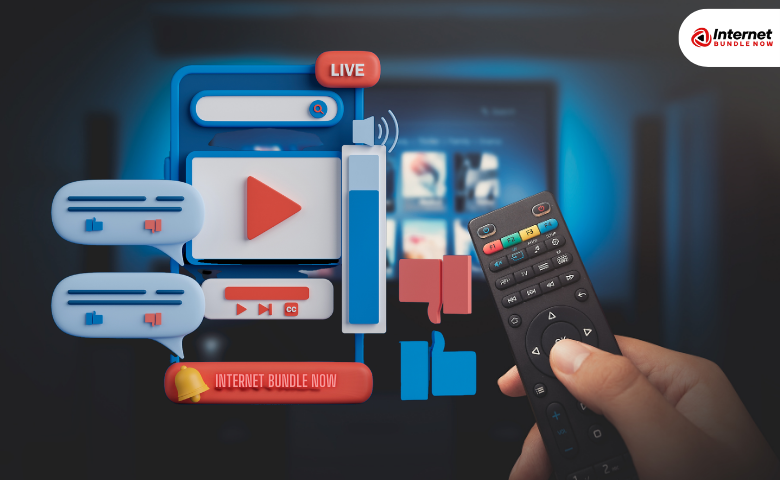- TV
How to Get Premium Channels with Your Cable TV Bundle?
Access to exclusive entertainment content is a priority for many viewers seeking a richer television experience. Premium chan...
Explore More
The way people consume entertainment has evolved significantly over the years. Traditional cable TV and modern streaming services are the two primary options, but which one offers better value? This blog explores the costs, benefits, and differences between cable TV and streaming services, helping you decide what’s best for your household. At Internet Bundle Now, we connect you with the best internet plans and top cable TV providers, ensuring seamless entertainment experiences.
Cable TV remains a popular choice for households that value reliability and comprehensive programming. With packages that include local channels, live sports, and premium networks, cable TV provides an extensive range of options for all types of viewers. Additionally, many cable TV providers offer bundled deals with internet services, which can save you money.
However, the cost of equipment, installation, and additional features like DVR can increase your monthly expenses. Long-term contracts with cancellation fees are another factor to consider, making cable TV less flexible than streaming.
Streaming services like Netflix, Hulu, Disney+, and Amazon Prime have revolutionized how people watch TV. They offer on-demand access to global content libraries, exclusive originals, and the ability to watch on multiple devices anytime, anywhere. The subscription-based model is more flexible, with no long-term contracts, allowing users to cancel or switch services easily.
However, streaming comes with its own costs. Subscribing to multiple platforms to access a wide variety of content can add up quickly. Additionally, streaming relies on a strong internet connection, which may require unlimited internet plans from reliable internet service providers.
Initial Costs
Cable TV often comes with equipment costs, including DVRs and set-top boxes, along with installation fees. In contrast, streaming requires a one-time investment in devices like Roku or Amazon Fire Stick, which are typically more affordable.
Monthly Fees
Cable TV packages can range from $50 to $150 per month, depending on the number of channels and add-ons. Streaming services start at around $10 per platform, but subscribing to multiple platforms can rival or exceed the cost of cable.
Add-On Expenses
Both options have add-ons, such as premium sports packages for cable TV or additional channel subscriptions on streaming platforms. Understanding these costs can help determine the more affordable choice for your household.
Hidden Costs
Cable TV often includes hidden fees for regional sports, broadcast stations, and equipment rentals. Streaming services, while more transparent, may require upgrading to a higher-speed internet plan, which adds to the overall expense.
Exclusive Programming
Cable TV shines with its live programming, including local news, sports events, and real-time broadcasts. Streaming services, on the other hand, excel in exclusive original content and international offerings.
Channel Lineups vs. Customization
Cable TV provides a fixed lineup of channels, which can be overwhelming or underused, depending on the household. Streaming platforms allow users to pick and choose services based on preferences, offering greater flexibility.
Accessibility and Convenience
Cable TV
Cable TV offers ease of use with a straightforward setup and remote-controlled browsing. However, it is less portable and limited to specific locations.
Streaming Services
Streaming’s portability is a significant advantage, allowing users to watch content on multiple devices, from smartphones to smart TVs. Many platforms also offer offline downloads, making them highly convenient for on-the-go viewing.
Household Preferences
Larger households with diverse viewing habits may find cable TV more economical due to bundled channels. Smaller or individual users often prefer streaming for its flexibility.
Viewing Habits
If live programming and local channels are essential, cable TV may be the better option. For those who prioritize on-demand content, streaming services provide unmatched value.
Internet Requirements
Streaming is heavily dependent on internet quality. Subscribing to the best internet plans ensures smooth streaming without interruptions. Households with multiple users may require unlimited internet plans to support heavy usage.
Advantages
Disadvantages
Advantages
Disadvantages
Many cable TV providers offer bundles with internet, making it easier to manage services and save money. Bundling can also unlock discounts and additional perks, such as premium channel access or free installation.
Streaming and Internet Requirements
To fully enjoy streaming, a robust connection from a reliable internet service provider is essential. Internet Bundle Now offers the best internet plans to ensure seamless streaming for multiple devices.
Future Trends in Cable TV and Streaming
The entertainment industry is evolving rapidly. Cable TV providers are incorporating streaming options into their packages, while streaming platforms are exploring live content. Hybrid models combining the strengths of both formats are becoming increasingly popular, offering the best of both worlds.
Choosing between cable TV and streaming services depends on your household’s preferences, viewing habits, and budget. While cable TV offers reliability and comprehensive programming, streaming provides flexibility and affordability. By evaluating your needs and leveraging solutions like bundled internet plans in USA, you can make an informed decision.
At Internet Bundle Now, we connect you with top ISP’s in USA, offering internet services and bundles tailored to your lifestyle. Explore our cable TV providers and unlimited internet plans today to find the perfect fit for your entertainment needs!
Latest insights, tips, and updates from our experts.
George
Comparing Cable TV and Streaming Services Which is More Cost-Effective?